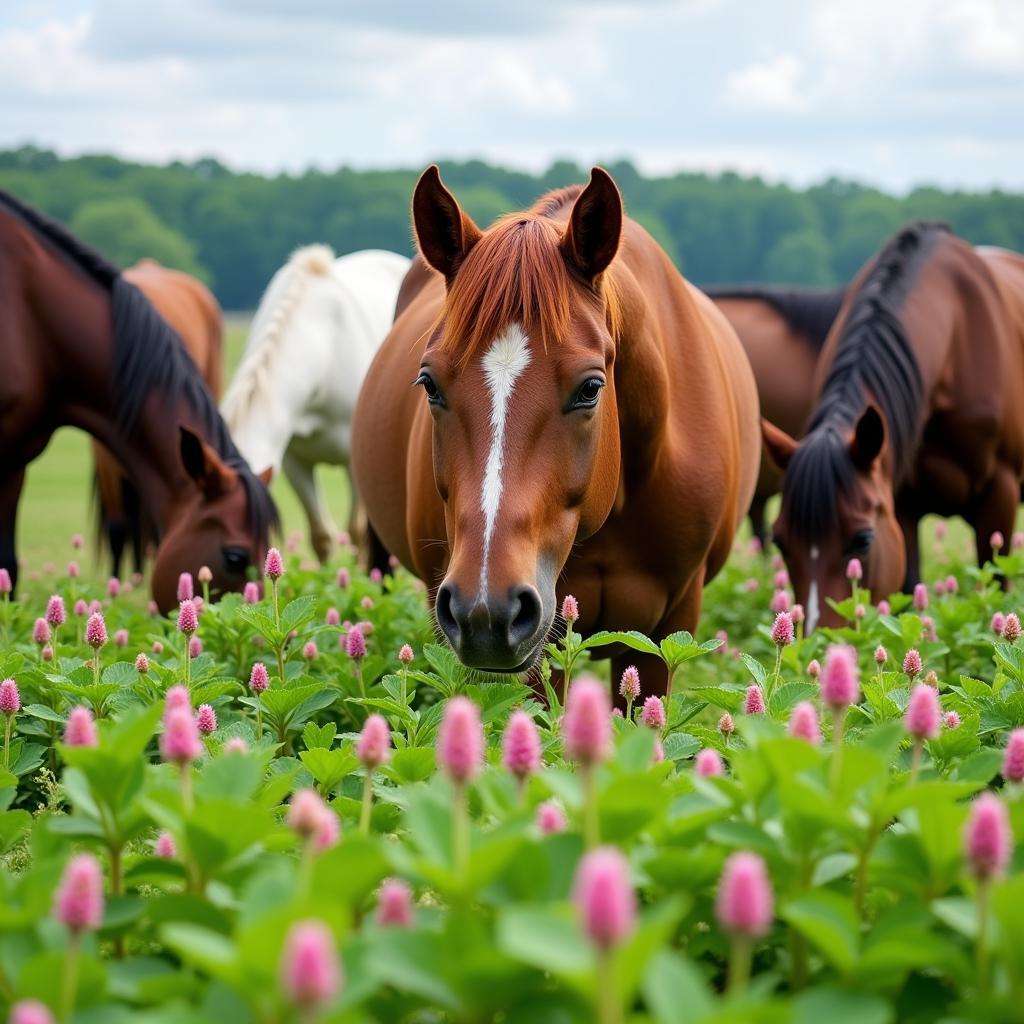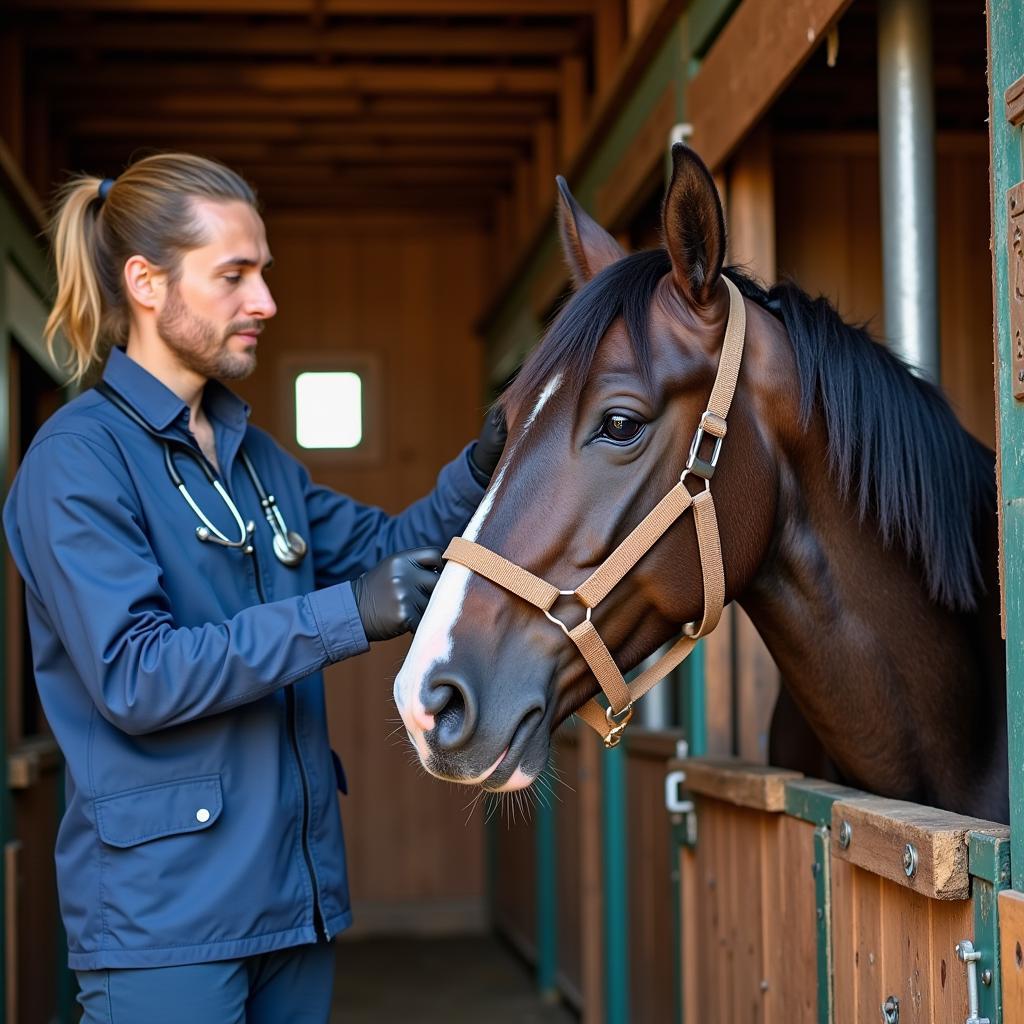Red clover for horses can be a beneficial part of their diet, but it’s crucial to understand the potential advantages and disadvantages before incorporating it into their feed. This article explores the nutritional value of red clover, its potential benefits and risks, and how to safely feed it to your equine companions.
Understanding the Nutritional Value of Red Clover
Red clover is a legume, like alfalfa, and is known for its high protein content. This makes it a potentially good forage source, particularly for growing horses, lactating mares, or those needing to gain weight. It’s also a good source of calcium and other essential minerals. Beyond its protein content, red clover contains isoflavones, which are plant compounds that can have both positive and negative effects on horses. These isoflavones can act as phytoestrogens, mimicking the effects of estrogen in the body.
For horse owners looking to diversify their horses’ forage, learning about the benefits of different hay types is essential. You can find more information about various hays, including sainfoin hay for horses, at sainfoin hay for horses.
Benefits of Red Clover for Horses
Red clover can offer several benefits when fed appropriately:
- Increased Protein Intake: The high protein content of red clover can help support muscle growth and repair, making it a good option for performance horses or those recovering from injury.
- Improved Milk Production: For lactating mares, red clover can help support milk production, ensuring healthy foals.
- Weight Gain: Horses struggling to maintain weight can benefit from the extra calories and nutrients provided by red clover.
- Palatability: Many horses find red clover palatable, encouraging them to eat and maintain a healthy appetite.
 Horses Grazing in a Field of Red Clover
Horses Grazing in a Field of Red Clover
Risks and Considerations When Feeding Red Clover
While red clover can be beneficial, there are also potential risks to consider:
- Photosensitization: Some horses can experience photosensitization, a skin reaction triggered by sunlight, after consuming red clover. This is more common with fresh red clover than dried hay.
- Bloat: Like other legumes, red clover can contribute to bloat, a serious digestive issue. Introducing it slowly and ensuring plenty of fresh water can help mitigate this risk.
- Estrogenic Effects: The isoflavones in red clover can have estrogenic effects, which may impact a mare’s reproductive cycle. Pregnant mares should avoid consuming large quantities of red clover.
- Mold and Mycotoxins: Improperly cured red clover hay can develop mold and mycotoxins, which can be harmful to horses. Ensure the hay is dry and free of mold before feeding.
Is red clover safe for all horses? Not necessarily. While many horses tolerate it well, individual reactions can vary. Always introduce red clover gradually and monitor your horse for any adverse effects. If you’re uncertain about whether red clover is appropriate for your horse, consult with your veterinarian.
How to Safely Feed Red Clover to Horses
If you decide to incorporate red clover into your horse’s diet, follow these guidelines:
- Introduce Gradually: Start with small amounts of red clover and gradually increase the quantity over several days to allow your horse’s digestive system to adjust.
- Choose High-Quality Hay: Opt for properly cured, dry red clover hay that is free from mold and dust. You can find information on choosing the best hay for your horse at best hay for horses.
- Monitor Your Horse: Observe your horse for any signs of photosensitization, bloat, or other adverse reactions.
- Consult Your Veterinarian: If you have any concerns about feeding red clover, talk to your veterinarian. They can help determine if it’s a suitable addition to your horse’s diet.
- Consider a Balanced Diet: Red clover should be part of a balanced diet, including other forages and grains, to meet your horse’s nutritional needs. Learn more about feeding clover to your horses at can horses eat clover.
 Veterinarian Examining a Horse in a Stable
Veterinarian Examining a Horse in a Stable
Conclusion
Red clover can be a good for horses when fed responsibly. Its high protein content and palatability make it a valuable forage option for many horses. However, it’s important to be aware of the potential risks, such as photosensitization and estrogenic effects, and take precautions to minimize these. By introducing red clover slowly, choosing high-quality hay, and monitoring your horse closely, you can safely incorporate this nutritious forage into your horse’s diet. For more specific information about red clover and horses, visit red clover for horses.
FAQ
- Can horses eat red clover hay every day?
- What are the signs of red clover poisoning in horses?
- How much red clover should I feed my horse?
- Can miniature horses eat red clover?
- Is red clover hay better than alfalfa hay for horses?
- What other legumes are safe for horses to eat?
- Can I mix red clover with other hay types?
Need more resources? Visit our website for more information on horse care and events like the Iron Horse Rodeo Pacific MO.
Need support? Contact us at Phone Number: 0772127271, Email: [email protected] Or visit us at QGM2+WX2, Vị Trung, Vị Thuỷ, Hậu Giang, Việt Nam. We have a 24/7 customer service team.